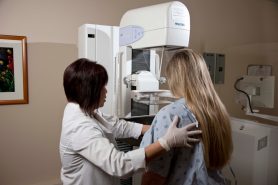- Diseases
- Acoustic Neuroma (14)
- Adrenal Gland Tumor (24)
- Anal Cancer (66)
- Anemia (2)
- Appendix Cancer (16)
- Bile Duct Cancer (26)
- Bladder Cancer (68)
- Brain Metastases (28)
- Brain Tumor (230)
- Breast Cancer (718)
- Breast Implant-Associated Anaplastic Large Cell Lymphoma (2)
- Cancer of Unknown Primary (4)
- Carcinoid Tumor (8)
- Cervical Cancer (154)
- Colon Cancer (164)
- Colorectal Cancer (110)
- Endocrine Tumor (4)
- Esophageal Cancer (42)
- Eye Cancer (36)
- Fallopian Tube Cancer (6)
- Germ Cell Tumor (4)
- Gestational Trophoblastic Disease (2)
- Head and Neck Cancer (6)
- Kidney Cancer (124)
- Leukemia (344)
- Liver Cancer (50)
- Lung Cancer (288)
- Lymphoma (284)
- Mesothelioma (14)
- Metastasis (30)
- Multiple Myeloma (98)
- Myelodysplastic Syndrome (60)
- Myeloproliferative Neoplasm (4)
- Neuroendocrine Tumors (16)
- Oral Cancer (100)
- Ovarian Cancer (170)
- Pancreatic Cancer (164)
- Parathyroid Disease (2)
- Penile Cancer (14)
- Pituitary Tumor (6)
- Prostate Cancer (144)
- Rectal Cancer (58)
- Renal Medullary Carcinoma (6)
- Salivary Gland Cancer (14)
- Sarcoma (236)
- Skin Cancer (296)
- Skull Base Tumors (56)
- Spinal Tumor (12)
- Stomach Cancer (60)
- Testicular Cancer (28)
- Throat Cancer (90)
- Thymoma (6)
- Thyroid Cancer (98)
- Tonsil Cancer (30)
- Uterine Cancer (78)
- Vaginal Cancer (14)
- Vulvar Cancer (18)
- Cancer Topic
- Adolescent and Young Adult Cancer Issues (20)
- Advance Care Planning (10)
- Biostatistics (2)
- Blood Donation (18)
- Bone Health (8)
- COVID-19 (362)
- Cancer Recurrence (120)
- Childhood Cancer Issues (120)
- Clinical Trials (626)
- Complementary Integrative Medicine (24)
- Cytogenetics (2)
- DNA Methylation (4)
- Diagnosis (230)
- Epigenetics (6)
- Fertility (64)
- Follow-up Guidelines (2)
- Health Disparities (14)
- Hereditary Cancer Syndromes (124)
- Immunology (18)
- Li-Fraumeni Syndrome (8)
- Mental Health (118)
- Molecular Diagnostics (8)
- Pain Management (62)
- Palliative Care (8)
- Pathology (10)
- Physical Therapy (18)
- Pregnancy (18)
- Prevention (898)
- Research (390)
- Second Opinion (74)
- Sexuality (16)
- Side Effects (604)
- Sleep Disorders (10)
- Stem Cell Transplantation Cellular Therapy (216)
- Support (404)
- Survivorship (322)
- Symptoms (184)
- Treatment (1774)
Cancer survivors: What to know about breast cancer screening
2 minute read | Published November 30, 2015
Medically Reviewed | Last reviewed by an MD Anderson Cancer Center medical professional on November 30, 2015
During cancer treatment, you may be focused on just one thing: beating cancer. But after treatment, it can be hard to remember to get your screenings for other cancers.
MD Anderson recommends that women 40 or older have annual mammograms. And that applies to cancer survivors, too, says Therese Bevers, M.D., Medical Director of MD Anderson's Cancer Prevention Center. And, in fact, they may need screenings more often.
If you're a cancer survivor, here are three things you should know about breast cancer screening.
It's important to find out if your breast cancer risk has changed.
Depending on what type of cancer you had, you may be at increased risk for a genetic mutation that increases your risk for breast cancer. For example, ovarian cancer patients who carry the BRCA genetic mutation are more likely to develop breast cancer.
The type of cancer treatment you had could put you at risk for breast cancer, too. Young women who were treated for Hodgkin's lymphoma with chest radiation are three times more likely than their peers to develop breast cancer.
It's important to talk to your doctor and find out if your breast cancer risk has changed. If it has, you may need to start undergoing mammograms earlier than the standard screening guidelines suggest. You also may want to consider 3-D mammograms, which offer more detailed images of the breast tissue.
The amount of radiation released from a mammogram is low.
Some patients worry that the radiation released in a mammogram will put them at greater risk for developing cancer again. But Bevers says the benefits far outweigh the risk.
That's because the amount of radiation released during a mammogram is very low. In fact, the radiation exposure you receive during a mammogram is about the same as you are exposed to during a round trip flight from Houston to London and back.
"You wouldn't cancel a trip to London because of you're worried about radiation," Bevers says. "So, why cancel your mammogram?"
Mammograms also release less radiation than other types of safe cancer screenings. The amount of radiation released in one CT scan of the chest is the same as the amount of radiation released during 100 mammograms.
Cancer screening is empowering.
Many patients feel anxiety or stress before a scan. But mammograms are nothing to worry about, Bevers says.
"Remember, by getting your mammograms, you're doing what you can to fight cancer," Bevers says.

By getting your mammograms, you're doing what you can to fight cancer.
Therese Bevers, M.D.
Physician
